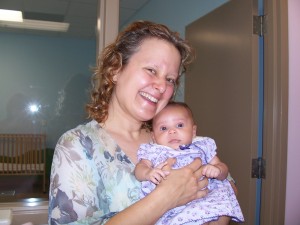
Alexandria and Adia LaFaye
Alexandria LaFaye is the author of Water Steps (read review), a story about a girl learning to overcome her fears and believe that life can be magic. LaFaye has also penned several other novels for young readers, including The Year of the Sawdust Man and Worth. Recently, LaFaye was able to talk through email about her newest book and more. Here’s the interview:
In Water Steps, Kyna has to overcome her fears one step at a time. Have you ever conquered a phobia that way?
AL: When I was five, I nearly drowned at a beach near my grandmother’s house. My mom rescued me just in time, so there is a hint of autobiography in the book. I was afraid to go underwater for quite some time. I took a similar approach to overcoming it—getting in the water and willing myself to go underwater and stay under a little longer every time. Facing my fears and praying to have God at my side has always been my approach to dealing with things I’m afraid of.
Irish folklore and mythical beings such as leprechauns, faeries and silkies are woven into the tales Kyna’s parents tell her. Are those stories you grew up with as well, or did you learn about those things after you grew up?
AL: My mom read stories out of books—everything from the Bible to Justin Morgan Had a Horse. My dad made up his own whimsical tales about when he was in the Civil War and so on. He drew a lot of inspiration from his favorites on TV, such as Jerry Lewis, Red Skelton, and Tommy Smothers. I teach children’s literature and often include mythology, so that’s where I came across many of these stories.
Kyna is adopted, and I see you’ve recently adopted a baby girl as well. Did you write about adoptive parents before you were one? How has your experience with adoption colored your view of adopting a child from both the parent’s and the child’s perspective?
AL: Actually, both Water Steps and Worth, which is also about adoption, were written well before I adopted my daughter, Adia. Adoption has always been part of my parenthood plan. I’ve always wanted a family that celebrates multiculturalism and shows that love is about choice and unconditional acceptance. I don’t believe that my view of adoption has changed much, except that now I am more eager than ever to adopt a second child in a few years. I’m also even more grateful to God for bringing little Miss Adia into my life.
Water Steps is described a a fantasy novel, but I would also say it is also contemporary fiction. Do you often blend genres in the things you write?
AL: I love genre blends and I refer to this novel as a reality based fantasy. My next novel, The Keening, due out with Milkweed Editions in the spring of 2010, is a supernatural-historical tale, so it’s also a blended genre novel. I look forward to doing more of those in the future. It’s a fun way to give a novel even more depth and unique twists and turns.
Out of all the places you have lived, do you have a favorite you’d like to go back to? What do you like best about Arkansas, where you live now?
AL: I get to return to Virginia every summer to teach in the Hollins University program in Children’s Literature. I go back to Wisconsin to visit family every time I return to Minnesota to teach in the low residency MFA in writing for children and young adults at Hamline University. The one place I’d love to return to is Pullman, Washington. They have a fabulous university and a quaint downtown lined with pear trees. I love the passion for books among the folks I know in Arkansas. I have also made one of the most life changing and supportive friendships of my life in Arkansas and I’m grateful to Yvonne Furniss for her friendship—she’s a book lover too!
On your website you say you’re an avid hat-wearer. Do you have a story to tell about discovering you loved to wear hats?
AL: You know, I’ve always loved them—I’m even wearing hats in my baby pictures. I guess, you could say I just never stopped wearing them when I grew up as many people do. Hats are a great way to top off a good outfit. I just never thought they’d attract so much attention. People aren’t used to women who wear hats outside of church. Too bad I couldn’t start a trend in hat wearing!
Is there anything you’d like to say to moms and daughters in book clubs?
AL: Never stop reading together and talking about what you read with each other, it’s a fabulous way to keep in touch, share your thoughts. And I recommend trading off on choices—let mom pick one, then daughter. And don’t be afraid to draw dad and brother in on the action. I’d also want to invite anyone who reads Water Steps or any of my other books to feel free to visit my website and ask me a question. And I love to visit book clubs, schools, and libraries to talk about reading, writing, and following your dreams.

















